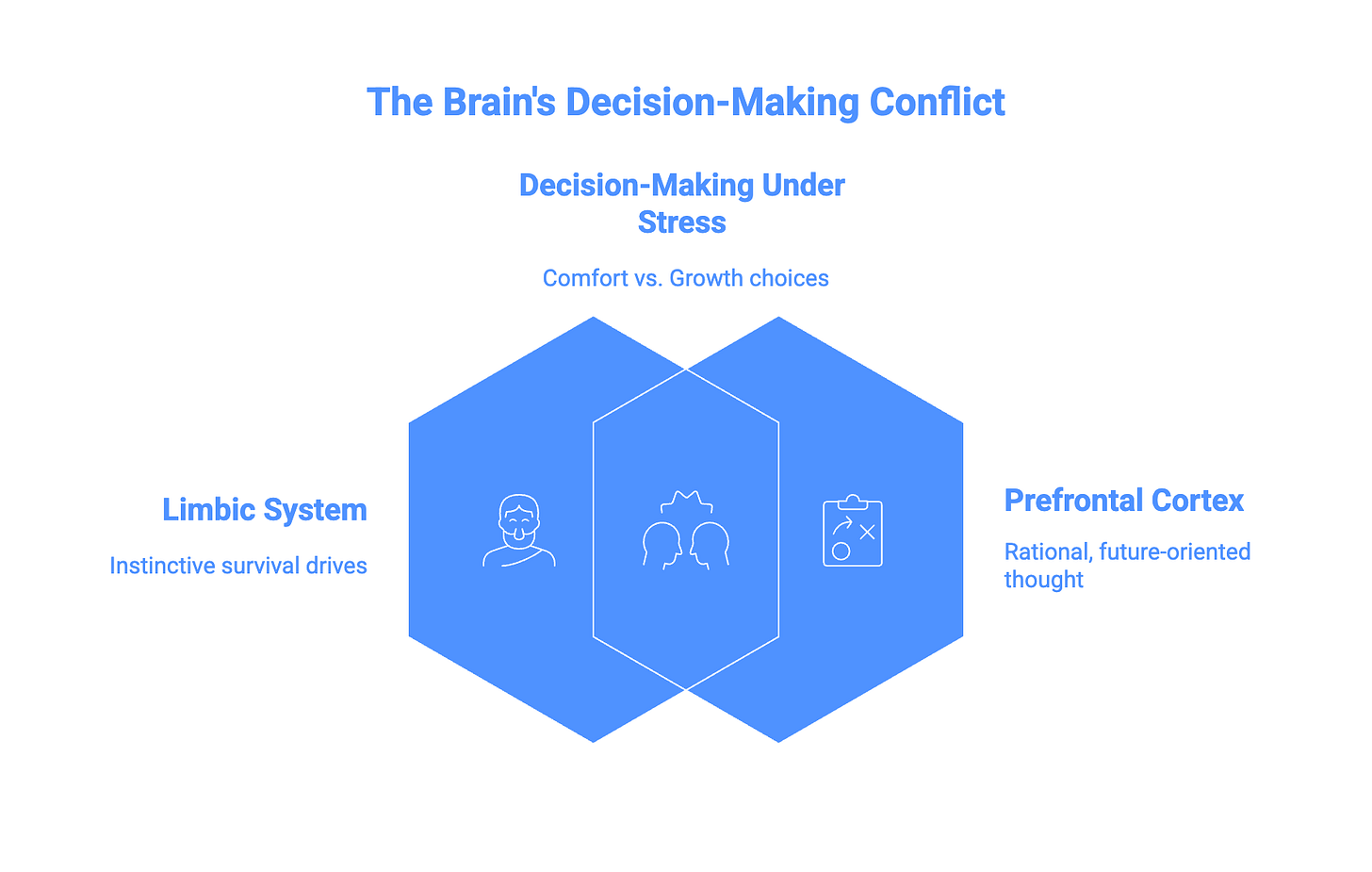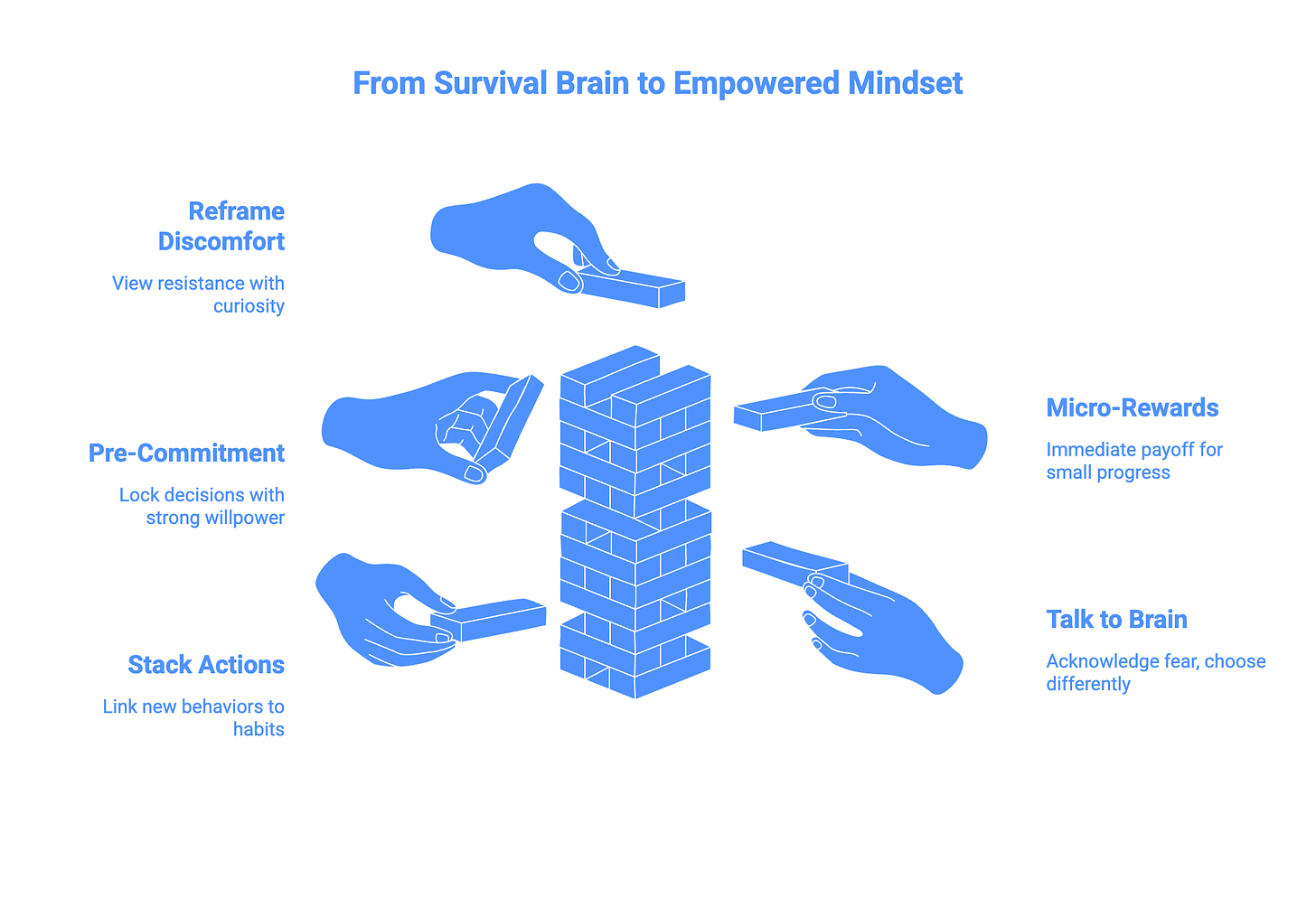Why Your Brain Thinks Your Inbox Is a Predator
our procrastination isn’t laziness. It’s ancient wiring optimized for survival, not achievement.
Hey Kwik Brain,
after you read this and you’ll understand why your brain fights you on important tasks, and how to win that fight without relying on willpower.
Your brain thinks your inbox is a tiger
You stare at that email. The one you need to send. The one sitting in drafts for three days.
Your palms sweat. Your stomach tightens. You open another tab.
This isn’t character weakness. Your limbic system, the ancient threat-detection machinery deep in your brain, genuinely perceives that email as danger. The same neural circuits that kept your ancestors alive by avoiding predators now flag uncomfortable tasks as threats to avoid.
The mismatch is absurd. Your prefrontal cortex knows the email won’t kill you. But your limbic system wins because it’s faster, older, and louder. It trades long-term success for immediate relief every single time.
The neural battle you’re losing
Two systems run your decision-making. They want opposite things.
The limbic system craves safety and comfort. Instant gratification. Energy conservation. It evolved to keep humans alive when hesitation meant survival. Modern triggers, ancient responses. Your brain can’t tell the difference between a predator and a performance review.
The prefrontal cortex handles reasoning, planning, delayed gratification. Growth lives here. So does discipline. But this system is slower, requires more energy, and gets overridden under stress.
Chronic stress shrinks your prefrontal cortex while strengthening fear circuits. Every time you choose comfort over challenge, you reinforce the survival pattern. The avoidance becomes automatic.
Procrastination isn’t about time management. It’s a neural negotiation where your survival brain keeps winning.
Why willpower fails
Your prefrontal cortex fatigues. Decision after decision drains it. By afternoon, your limbic system dominates, and suddenly you’re scrolling instead of shipping.
The traditional advice, “just push through,” ignores how your brain actually works. You’re not weak. You’re fighting millions of years of evolution with a few hours of morning coffee.
The immediacy trap
Studies on delayed gratification show we consistently choose smaller rewards now over larger rewards later. Your brain discounts future value steeply. Tomorrow’s success can’t compete with today’s comfort.
This wiring made sense when food was scarce and danger was constant. Now it keeps you stuck.
Rewiring strategies that actually work
Stop fighting your survival brain. Work with it instead.
Reframe discomfort as curiosity
When resistance hits, pause. Don’t force yourself through it. Instead, get curious about the sensation itself. “Interesting. My chest feels tight. My thoughts are spinning.”
This shift moves you from limbic reactivity to prefrontal observation. The emotion loses power when you examine it rather than obey it.
Ask: “What specifically feels threatening about this task?” Often the answer reveals the threat is imagined, not real.
Micro-rewards for micro-progress
Your limbic system needs immediate payoff. Give it one.
Send one email: walk outside for two minutes. Write 200 words: make the good coffee. Finish the deck: text a friend.
The reward must be immediate and pleasurable. This isn’t bribery. It’s training your survival brain that progress feels good too. Over time, the work itself becomes associated with reward, not threat.
Pre-commit while your prefrontal cortex is strong
Morning you has more cognitive resources than afternoon you. Use this window to lock in decisions.
Set calendar blocks. Delete apps. Put your phone in another room. Pay for that course. Tell someone your deadline.
Pre-commitment removes future decision points where your limbic system might win. You’re not relying on willpower when it matters. You’re relying on systems set up when willpower was abundant.
Talk to your survival brain
Sounds ridiculous. Works consistently.
When anxiety hits: “Thank you for trying to protect me. I notice you think this is dangerous. We’re actually safe right now. This discomfort won’t harm us.”
Metacognition, thinking about your thinking, activates your prefrontal cortex. It interrupts the automatic fear response. You’re not suppressing the emotion. You’re acknowledging it while choosing differently.
Stack tiny actions
Link new behaviors to existing habits. After morning coffee, write for two minutes. After lunch, review one task. After closing your laptop, plan tomorrow.
Each link creates a neural pathway. Over weeks, these pathways strengthen until the action feels automatic. Your limbic system stops resisting because the pattern feels familiar, therefore safe.
What changes when you stop fighting yourself
You’ll still feel resistance. That never disappears completely.
But you’ll recognize it for what it is: outdated programming, not truth. The emotion becomes information, not instruction.
Your brain spent millions of years optimizing for survival. It spent zero years optimizing for quarterly targets, creative breakthroughs, or personal growth.
Growth means choosing discomfort on purpose. Not because you’re motivated. Because you understand the mechanism and refuse to let ancient wiring dictate modern outcomes.
Pick one strategy from this list. Try it tomorrow morning. Watch what your survival brain does when you don’t obey it.







This is aN ABSOLUTELY FASCINATING way of looking at brain function, psychopathology and psychotherapy. It presents a whole different way of conceptualizing Cognitive Behavioral Therapy and explaining why it works. I'm a neuropsychologist and have a lot of experience doing psychotherapy. This article just amazed me and made me wonder why I never thought to conceptualize all these ideas in this way. Great work!
Growth means choosing discomfort on purpose
That hit hard ..